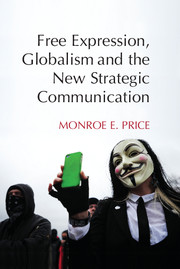Book contents
- Frontmatter
- Contents
- Acknowledgments
- 1 Moving the Needle, Filling the Streets
- 2 Strategic Communication and the Foundations of Free Expression
- 3 Narratives of Legitimacy
- 4 Strategies of the Diagnostic
- 5 Asymmetries and Strategic Communication
- 6 Strategies of System Architecture
- 7 Soft Power, Soft War
- 8 Religions and Strategic Communication
- 9 Regulating NGOs in the Market for Loyalties
- 10 Strategic Platforms
- 11 Strategic Communication and Satellite Channels
- 12 Strategies of Closure, Markers of Anxiety
- Bibliography
- Index
- References
3 - Narratives of Legitimacy
Published online by Cambridge University Press: 18 December 2014
- Frontmatter
- Contents
- Acknowledgments
- 1 Moving the Needle, Filling the Streets
- 2 Strategic Communication and the Foundations of Free Expression
- 3 Narratives of Legitimacy
- 4 Strategies of the Diagnostic
- 5 Asymmetries and Strategic Communication
- 6 Strategies of System Architecture
- 7 Soft Power, Soft War
- 8 Religions and Strategic Communication
- 9 Regulating NGOs in the Market for Loyalties
- 10 Strategic Platforms
- 11 Strategic Communication and Satellite Channels
- 12 Strategies of Closure, Markers of Anxiety
- Bibliography
- Index
- References
Summary
A state is, in part, a collection of stories connected to power. Remembered traditions, obligations and laws – all stories in themselves – shape internal and external perceptions of a state and the range of its efficacy. But the collection of stories that define the state transforms over time with important consequences. Within the bandwidth of circumstances we might call reality, it is important to understand who manufactures such stories and what levers of control are deployed in their diffusion. Viable states fight to manage and limit the process of narrative transformation both at home and abroad. A sense of loss of state power intensifies when significant aspects of self-characterization fall out of national control, when, for example, a state or its leadership change in the global imagination from moral hero to delegitimated villain, from keeper of ideals to perpetrator of evil, from agent of desirable stability to vessel for potential protest and disorder, from representative of financial reliability to economic profligate. Because narratives are part of the mythic architecture of the state, how they are produced, and with what consequences, becomes an important part of understanding state power, regime stability and the interactions between local and global processes and structures. The narratives – and their shaping – are products of the global and local speech and press environments in which the state is made legible. Those strategic communicators designing and shaping the narratives are “ideational entrepreneurs” who form or enrich “epistemic communities” that sustain and legitimate alternative futures. Other states and major groups (NGOs, rival political entities, etc.) have a stake, often quite a desperate one, in how these narratives are framed, and the effort to affect such narratives both draws on and challenges ideas of free expression. The daily dramas, bold adventures and frequent tragedies of expression take place against the background of intense, large-scale maneuvering.
- Type
- Chapter
- Information
- Publisher: Cambridge University PressPrint publication year: 2014



